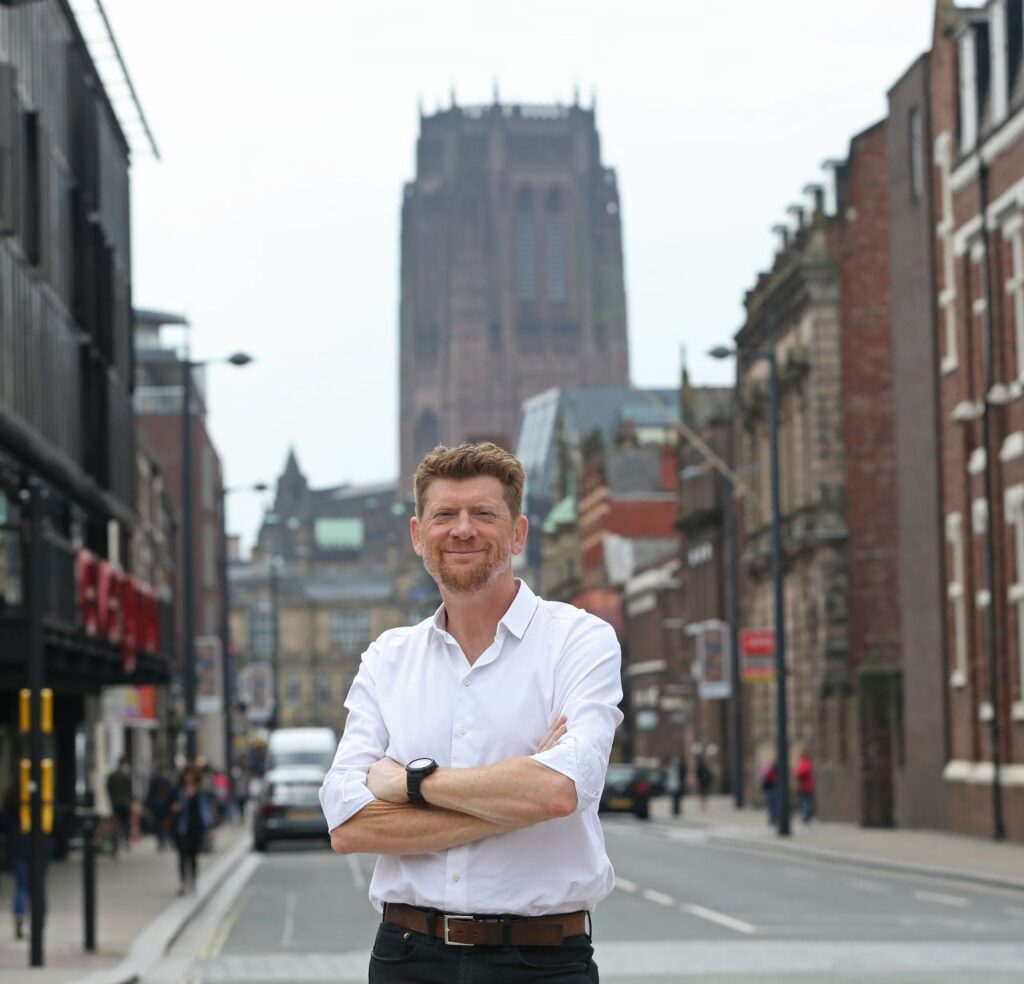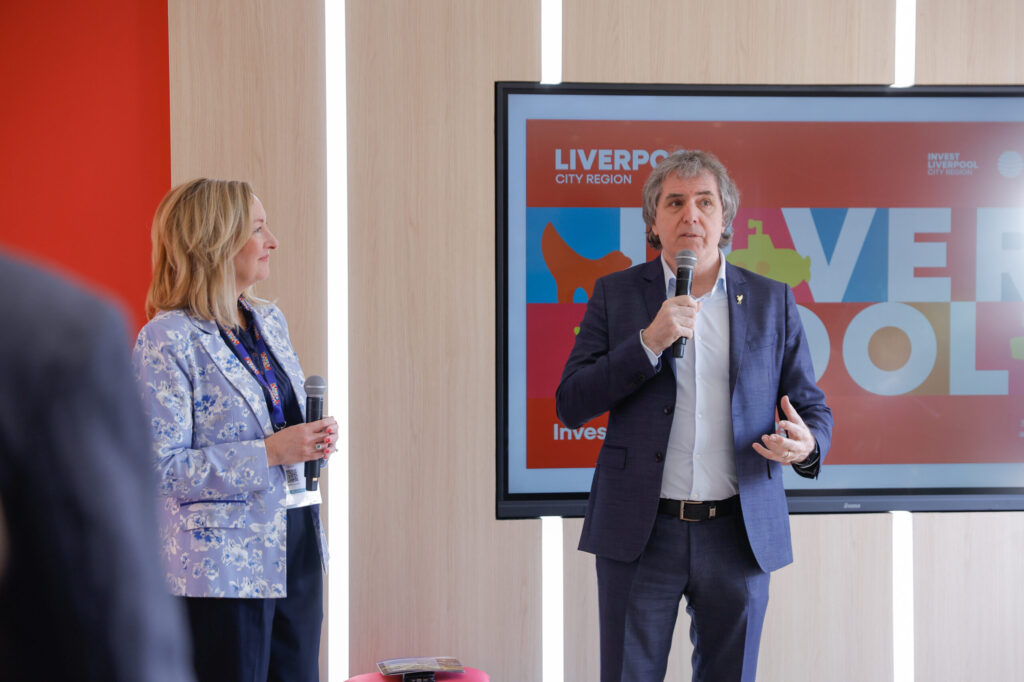The Liverpool City Region Life Sciences Innovation Zone will take the city region’s life sciences to the next level.
With the potential to drive up to £800m of Government and private investment and create 8,000 jobs, it is dedicated to drive growth and foster collaboration within the life sciences sector.
This zone serves as a hub for innovation, research, and business development, whilst training a new generation of talent. And, like the Liverpool City Region Freeport, it will offer attractive financial benefits to investors.
World-leading innovation from world-class assets
The city region boasts one of Europe’s most prominent pharmaceutical clusters, where global companies like AstraZeneca, CSL Seqirus, and Pharmaron lead the way in providing international solutions. Recognized as the UK Government’s sole High Potential Opportunity for Vaccines, the region is also at the forefront of clinical trials, with over 7,000 volunteers contributing to its success.
The £260m iiCON program, driven by the Liverpool School of Tropical Medicine, partners with more than 800 companies globally, having introduced 36 new products and delivered over 5 billion life-saving units in under four years. In collaboration with the University of Liverpool, the world’s first tropical disease institute is spearheading the UK’s most concentrated infection research and development sector, contributing £2bn annually.
At the STFC Hartree Centre, the UK’s leading supercomputer for industrial R&D plays a key role in advancing digital health solutions. Additionally, the region is home to the UK’s largest concentration of specialist hospitals outside of London, which are making significant strides in areas such as children’s health, cancer care, neurology, and mental health.
Exceptional collaborations between top-tier scientific institutions and industry experts drive world-leading innovation. This partnership leverages state-of-the-art facilities to shape the future of life sciences, focusing on strengths in therapeutics, animal health, bio-manufacturing, and the application of Big Data and AI to improve overall health outcomes.

Scientists at Sci-tech Daresbury
Advancing Life Sciences in the Region
The 10-year Innovation Zone is set to significantly advance the life sciences sector in the city region. With an expected boost of up to £800 million in both Government and private sector investment, the initiative will create 8,000 new jobs. The Innovation Zone aims to provide cutting-edge facilities, comprehensive business and innovation support, and opportunities to nurture a skilled workforce. Like the Liverpool City Region Freeport, it will offer appealing financial incentives to investors
The first phase of the project includes 21 grant-supported initiatives, collectively unlocking over £320 million in private funding. The University of Liverpool is also preparing a £200 million investment plan to back the Zone’s development.
The Government will contribute £160 million, with 60% allocated to capital investments in state-of-the-art office and laboratory spaces, as well as capital grants for innovation businesses. The remaining 40% will be directed toward projects focused on business support, research and innovation, and workforce development.
Furthermore, Halton and St Helens Borough Councils will benefit from retained business rates for the next 25 years, with Halton set to keep up to £35 million and St Helens up to £15 million. These funds will be earmarked for further enhancing infrastructure and capabilities.
The three key Innovation Zone tax sites—St Helens, Sci-Tech Daresbury, and Maghull Health Discovery Park—will provide new and expanding businesses with a range of financial advantages, including:
- 100% Business Rate Relief for the first five years
-
- Exemption from Stamp Duty Land Tax (SDLT)
-
- Relief from employer National Insurance contributions (for three years, valued at £6,582 per employee)
- Additional benefits such as Structures and Buildings Allowances and Enhanced Capital Allowances for better cash flow management
In addition, specialised skills and talent programs will focus on training local workers to support recruitment needs. Projects will also prioritise social value, net-zero goals, and enhancing diversity and inclusion.

Maghull Health Park
Innovation Zone Locations and Initiatives
The city region’s life sciences research and innovation is underpinned by two key, nationally significant campuses in Liverpool and Daresbury. These campuses are complemented by emerging Innovation Zone clusters in Maghull and St Helens, home to the global industry-led Glass Futures project, focused on glass innovation and decarbonization.
Liverpool’s Knowledge Quarter serves as a central hub for life sciences, hosting prestigious institutions such as the University of Liverpool, Liverpool John Moores University, the Liverpool School of Tropical Medicine (LSTM), the Royal Liverpool University Hospital, and Clatterbridge Cancer Centre. This area also supports a large community of 26,000 health and life science students.
Among the key facilities in this area is the £81 million Materials Innovation Factory (MIF), a ground breaking industry-academia collaboration with Unilever, focused on advancing global digital chemistry. Additionally, the Knowledge Quarter houses the Digital Innovation Facility (DIF), Liverpool Science Park, the Open Innovation Hub for Antimicrobial Surfaces, and the University of Liverpool’s renowned Chemistry and Pharmacology Departments are also located there.
The Royal College of Physicians has established its northern headquarters at The Spine, a building recognized as one of the healthiest in the world. It will be joined by two new high-tech buildings, HEMISPHERE One and Two, supported by the Innovation Zone. These state-of-the-art structures will offer advanced labs and office spaces for continued growth in the life sciences sector.
Our global ambition
The Liverpool City Region is setting its sights on a bold global future, with a target of investing 5% of its economic output in research and development (R&D) by 2030—almost double the national goal. This reflects the region’s strong local ambition to make a significant impact on the global stage.
With a £2 billion R&D pipeline and an additional £725 million worth of active projects across the six local authorities – Halton, Knowsley, Liverpool, Sefton, St Helens, and Wirral – the region is not only a leader in infection prevention and control but is also gaining international recognition for its advancements in materials chemistry, AI solutions, and emerging strengths in net-zero technologies and maritime innovation.
The region benefits from unified leadership across political, business, institutional, and scientific sectors, with the UK’s first industry-led regional Innovation Board at the helm. Strategic collaborations with Innovate UK and Busan, South Korea’s second-largest city, have cemented its place as a global innovation hub.
To enhance connectivity, the region has rolled out LCR Connect, a state-of-the-art, publicly backed 214km full-fibre network that provides gigabit-speed internet, positioning the area as the UK’s most digitally connected region.
A private-sector-led Business and Enterprise Board plays a key role in shaping policy, with cluster boards representing critical sectors such as health and life sciences, advanced manufacturing, and digital and creative industries. These sectors are supported by numerous collaborative networks within the region’s dynamic ecosystem.
Additionally, a wide range of tailored funding opportunities and programs are available to support businesses at every stage of their innovation journey.







